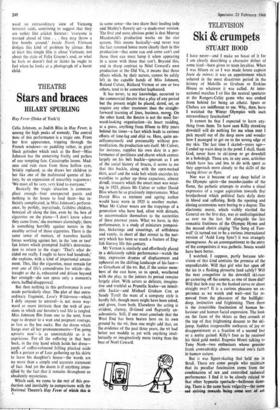THEATRE
Stars and braces
HILARY SPURLING
Hay Fever (Duke of York's) Celia Johnson, as Judith Bliss in Hay Fever, is among the high peaks of comedy. The central note of this performance is a tragic one. From her first appearance, tripping through the French windows—or paddling rather, in giant black goloshes which suck at the floor—Miss Johnson has the unnerving frailty and pathos of one tempting fate. Catastrophe looms. Mad- ness and ruin stare from those hollow eyes, briskly replaced, as she draws her children to her like one of the maltreated queens of his- tory, by an expression of unearthly vagueness: 'We must all be very, very kind to everyone.'
Basically the tragic situation is common- place enough—four unexpected guests and nothing in the house to feed them—but in- finitely complicated, in Miss Johnson's perform- ance, by perfidy, ingratitude, faithless children, betrayal all along the line, even by the box of cigarettes on the piano—'I don't know where they came from,' she murmurs alarmingly; there is something horribly against nature in the stealthy arrival of those cigarettes. There is the same sense of menace, of nameless hostile forces working against her, in the 'one or two' fan letters which prompted Judith's determina- tion to return to the stage: 'That's what de- cided me really. I ought to have had hundreds,' she explains, with a kind of impersonal amaze- ment. This, like the cigarettes, must remain for ever one of life's conundrums for which—dis- traught as she is, exhausted and driven beyond her strength—she can spare only a moment's stern, baffled disapproval.
But then nothing in this performance is ever made particularly clear. The plot of that extra- ordinary fragment, Love's Wilderness—which I defy anyone to unravel—is not more way- ward or more intricate than the web of pas- sions in which our heroine's real life is tangled. Miss Johnson flits from one to the next, from rage to despair to a wan and poignant courage, as fast as the bee sucks. But the doom which hangs over all her pronouncements—'I'm going upstairs now'—is as unmistakable as it is capricious. For all the suffering in that bent back, in the tiny hand which holds her dress— yards of coffee-coloured frilling plucked aside with a gesture as of Lear gathering up his skirts to leave his daughter's house—the words are no more than a simple and accurate statement of fact. And yet the doom is if anything inten- sified by the fact that it remains throughout so absolutely mysterious.
Which said, we come to the rest of this pro- duction and inevitably to comparisons with the National Theatre's Hay Fever of which this is
in some sense—the two share their leading lady and Motley's flowery set—a made-over version. The first and most obvious point is that Murray Macdonald's production works on the star system. This means basically —and never was the fact rammed home more clearly than in this production—that some can and some can't and those than can must lump it when appearing in a scene with those that can't. Beyond this, and in sharp contrast to Noel Coward's own production at the Old Vic, it means that those effects which, by their nature, cannot be safely left in the capable hands of Miss Johnson, Roland Culver, Richard Vernon or one or two others, tend to be somewhat haphazard.
It has never, to my knowledge, occurred to the commercial theatre that a play of any period but the present might be placed, dated, set, or require any other treatment than the straight- forward learning of lines, business, moves. On the other hand, the theatre is not the most for- ward-looking organisation—its heart residing, at a guess, anything from fifteen to fifty years behind the times—a fact which leads to curious effects of time-lag and déjà vu. Here, quite un- selfconsciously and presumably without pre- meditation, the production sets itself. Mr Culver, for instance, supplies his own date in a per- formance of portliness and charm which centres largely on his belt buckle—ignorant as I am of the social history of braces, it seems to me that this buckle, along with the open-necked shirt, scarf and the wide belt which encircles his waistline to gather up those capacious, almost dirndl, trousers which the smart man was wear- ing in 1925, places Mr Culver or rather David Bliss whom he so graciously impersonates. What David Bliss as eminent and ageing author would have worn in 1925 is another matter. What Mr Culver wears are the trappings of a generation who have had, often with distaste, to accommodate themselves to the austerities of these postwar years. What we have, in this performance, is a study of miniature pomposi- ties, bickerings and cossetings, of selfishness and vanity, in short of that retreat to the nur- sery which has been so much a feature of Eng- lish literary life this century.
Mr Vernon is similarly and effortlessly placed in a deliciously subtle performance—watch the tiny, expressive dramas of displacement and upheaval on the shifting landscape of his face— as Greatham of the Fo. But, if the senior mem- bers of the cast have, so to speak, weathered with the play, to the juniors its period remains largely alien. With actors as delicate, imagina- tive and truthful as Prunella Scales—an inimit- able Jackie—and Michael Graham Cox as Sandy Tyrell the want of a company style is hardly felt, though more might have been asked, and given, from both. Elsewhere the acting is strident, clumsy, ill-timed and flagrantly an- achronistic. Still, if one must conclude that the West End has been beaten here on its own ground by the NT, then one might add that, on the evidence of the past three years, the NT had better not meddle as yet with anything intel- lectually or imaginatively more taxing than the best of Noel Coward.


































 Previous page
Previous page